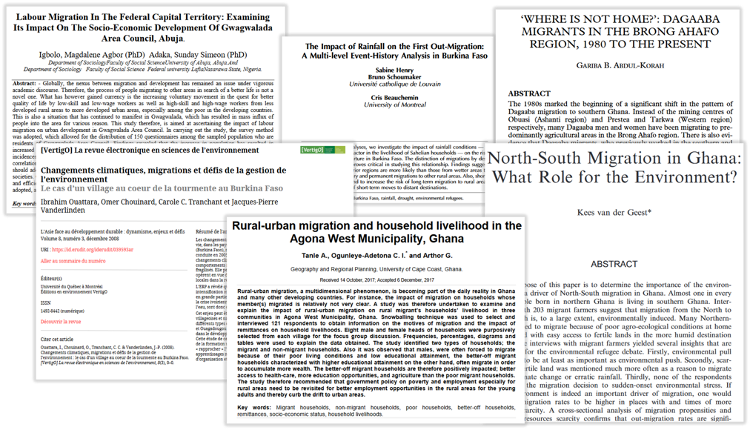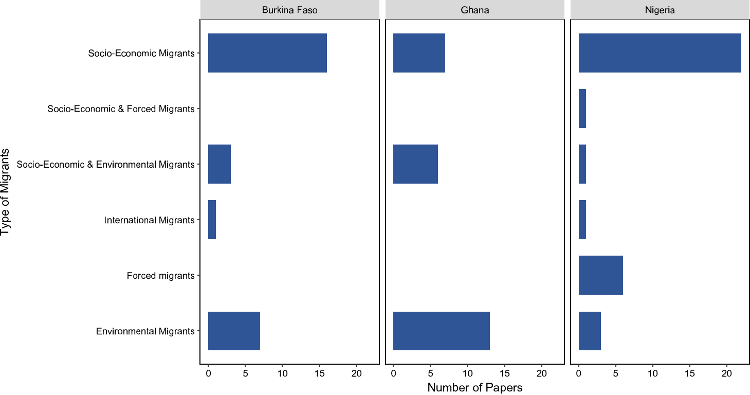
Migration is a complex phenomenon that requires careful analysis by researchers to understand its nature and magnitude. It also involves many factors such as economic growth, political stability and peace in the host country, institutional capacity (particularly with regard to governance), social structure (including gender issues), infrastructure development, etc. Migration is a common phenomenon around the world. Many people move from one place to another in search of better opportunities and a better quality of life. Migration is one of the most important issues in Africa. It is a phenomenon that has been happening since the beginning of time, but it is only recently that its impact has been felt on a large scale. In Burkina Faso, Ghana, and Nigeria, millions of people are leaving their countries to seek better opportunities abroad.
The three countries have very different situations, but they are all experiencing migration pressures. In Burkina Faso, the population growth rate is extremely high because of high fertility rates and poor living conditions. This creates a scarcity of jobs for young people and makes them more vulnerable to migration. In Ghana, there are also many unemployed youths who want to improve their lives by moving to other countries. The same applies for Nigeria, where most citizens live below the poverty line and cannot afford to send their children abroad for education or work purposes.
The study aimed at understanding the types of migrants, the migration routes, and the research methodology employed by the authors in Burkina Faso, Ghana, and Nigeria. This was done by reviewing 119 articles. The methodologies employed by authors in the countries of interest, as shown in Figure 1, included literature reviews, surveys, interviews, focus group discussions, etc.

In this research, the term “migrant” is used in its widest sense to refer to anybody who moves for whatever reason from one nation to another. This can include those who were born in one nation but travel to another for employment or school, as well as those who were born in another country but migrate to another country. We also consider migrants who are escaping war or persecution, regardless of whether they are crossing international boundaries. The bulk of migrants are adult males and females, but children are also present. According to the studies, there is substantial internal movement between rural and urban areas in Ghana, Burkina Faso, and Nigeria.
There are three types of migrants in Burkina Faso, Ghana and Nigeria. These are:
– Environmental migrants: These are people displaced by natural disasters, such as floods or droughts, who move to other parts of the globe. They are usually unable to return home due to a lack of funds or political instability, which makes them feel safer staying overseas. people who have had to migrate due to deteriorating environmental conditions. They may be forced to migrate if their habitat is destroyed or if they have no alternative means of subsistence. These are those displaced by natural disasters, such as floods or droughts, who move to other parts of the globe. They are usually unable to return home due to a lack of funds or political instability, which makes them feel safer staying overseas. These are people who have moved to a new place as a result of the pollution in their former homeland (see Figure 2).
– Socio-economic migrants: the unemployed, underemployed, and low-earners—sometimes traverse international boundaries to find work. Due to unemployment, these people moved abroad. Ghanaian farmers have moved to cities to work as industrial workers or domestic servants. These people leave home to work or study abroad owing to a lack of opportunities. They may also flee war zones (areas where there is persistent violence between various factions within a community or even across cultures, such as fights for land ownership rights, etc.). Relocated workers, students, and refugees comprise this group. Burkina Faso, Ghana, and Nigeria have seen a surge in immigration. The West African economic slump is the main cause. Due to high unemployment and poverty rates, many have left for better opportunities. These people leave home to work or study abroad owing to a lack of opportunities. They may also flee war zones (areas where there is persistent violence between various factions within a community or even across cultures, such as fights for land ownership rights, etc.).

– Political migrants or Forced migrants: These are individuals who migrate from one country to another as a result of political turmoil or armed conflict between two nations. Refugees are individuals who leave their home country in search of better opportunities elsewhere. They may be fleeing war or violence or seeking political asylum or military service in another nation. These are individuals who leave their native countries owing to political persecution (such as arbitrary detention or state-sponsored torture, etc.) – See Figure 3).


The Author:
Itohan-Osa Abu
Since 2021, Itohan-Osa has been investigating the push and pull effects of industrial sites in rural Africa. Her research forms part of her PhD studies with sponsorship from the German Federal Ministry of Education and Research (BMBF) through the MIGRAWARE Project.
Your point of view caught my eye and was very interesting. Thanks. I have a question for you.
Thank you for visiting our Blog on the MIGRAWARE WEBSITE. We hope you found our post insightful. We will be pleased to respond to any questions you may have with your post. Feel free to send us your question(s) and we will respond appropriately. Thank you.